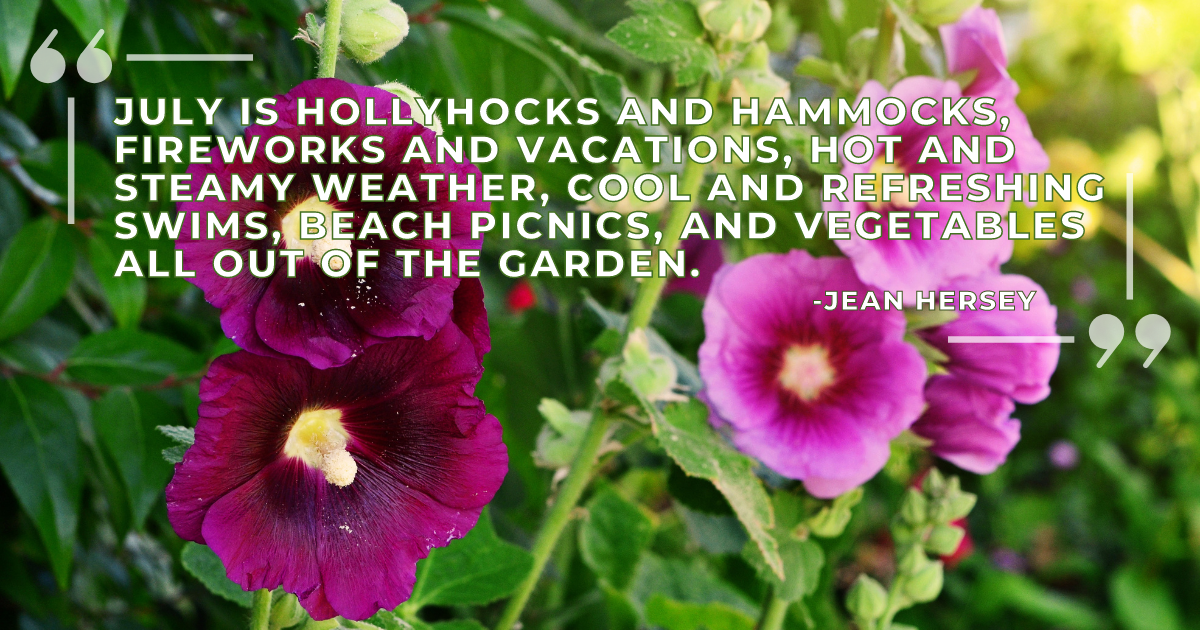- Expect some leaf fall, a normal reaction to drought. Watering young plantings well will reduce stress. See Marcum’s Watering Guidelines for watering trees and shrubs.
- Complete another simple irrigation check to identify any problems with your irrigation system. This will help to reduce water use/waste and ensure that plants are receiving adequate water to get them through the hot, dry summer months.
- Give plants a mid-season feeding to them through fall.
- Revitalize your trees and shrubs with ferti-lome® Fish Emulsion.
- Divide and replant bearded iris and other summer blooming perennials after flowering until August.
- Shear back spent annuals by 1/3, and do a final pinching of fall blooming perennials (like asters and mums) by mid-July.
- Don’t forget to mulch! Mulch can help reduce weeds as well as retain moisture around your plants. We have plenty of choices of premium mulches!
- Keep bird feeders and baths clean!
The Essential Guide for July Lawn & Garden Maintenance

Summer is Here!
Check out our essential guide for July lawn & garden maintenance. We have timely tips and expert advice on how to keep your lawn and gardens in tip-top shape as temperatures increase.


- Fertilize warm-season grasses using one of Marcum Nursery’s exclusive fertilizers made in Oklahoma: Kelly Ray’s Fast Growing Fertilizer 46-0-0, Big Mont’s Nitro Green 31-0-0, BR’s Lawn Tonic 28-6-12, or Original Slow Release Fertilizer 18-6-12.
- Mowing heights for cool-season grasses should be 3″ during hot, dry summer months. Gradually raise the mower height of bermudagrass lawns from 1 1/2 inches to 2 inches.
- If you have brown patch disease or dollar spot showing up on your turf grass, apply ferti-lome® Liquid Systemic Fungicide II or ferti-lome® F-Stop at the earliest signs of disease. These treatments are more effective when applied in early spring and fall before disease development, so consider making these a part of your lawn management program if you regularly have problems with lawn fungal diseases.
- Meet water requirements of turf, which for most warm- and cool-season grasses is about 1″ of water per week.

- There are several crops that can be started by seed this month; cowpea and pole beans, cilantro, pumpkins, and summer and winter squash.
- Plant a cover crop in bare spots in the vegetable garden.
- Container perennials, shrubs, and trees can still be planted as long as they are supplied adequate water.

- The hotter and drier it gets, the larger the spider mite populations become. Spraying a forcible stream of water can provide partial relief of this pest. However, to eliminate them, spray plant foliage with ferti-lome® Broad Spectrum Insecticide, ferti-lome® Triple Action, ferti-lome® Insecticidal Soap Concentrate, ferti-lome® Spinosad Soap Concentrate, orHi-Yield 55% Malathion.
- Look carefully for bagworms. If found while young, it is easier to treat them. Apply ferti-lome® Spinosad, ferti-lome® Caterpillar Spray with BT, or Hi-Yield 55% Malathion.
- For preventative white grub treatments, apply Hi-Yield Grub Free Zone II in late June to mid-July.
Note: Thanks to Oklahoma Coop Extension Service for providing some of the suggested maintenance guidelines.
Back to Home